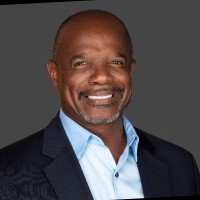Table of Contents
Thom Jackson is President and CEO of EdisonLearning, a company that is delivering high-quality content for grades 6-12 through innovative digital means, with the mission of shaping a world in which every student, regardless of socioeconomic circumstance, has access to an excellent education. In this interview, he discusses the collaborative process that leads to increased access for underserved students and shares some moving anecdotes that illustrate how his personal and professional trajectories were influenced.
A Pathway to Success
At first glance, people might look at Jackson’s background in litigation, mergers and acquisitions and develop an oversimplified impression based solely on an impressive professional resume. What they are missing is the extraordinary early story that paved the way for his success. During his eighth-grade year, a teacher by the name of Dotty Cantrell pulled a misbehaving Jackson aside and, rather than merely chastising him, allowed him to prove himself by entering into her advanced English class. It catapulted him ahead.
“It was the early ‘70s when a lot of us who were young African Americans were put in remedial courses. For some reason, [Cantrell] decided this kid who was goofing off should be in her advanced English class sitting in the front row. I will tell you that it literally changed my life. She was instrumental in making sure to introduce me to folks that I just didn’t know, frankly, existed. I lived in public housing and my mother was a single mom with five kids. It was not uncommon for us to look out a window and see people getting shot. It was a proverbial war zone. For whatever reason, she singled out this particular kid. And before I knew it, I was not only in advanced English classes but also in chemistry and math. To tell you how dramatic it was, of the three [other] guys that I was goofing off with, none of them saw their 18th birthday, and at least one of them went to the juvenile system. It’s clear to me that she saved my life that day in more ways than one,” explains Jackson.
Jackson never forgot the importance of Cantrell as an educator and early mentor. When he had the opportunity to go to EdisonLearning, he vowed to pay forward the generosity of character that she instilled. Jackson elaborates, “When I think about what really drives me and why I have to do what I’m doing, I think about the fact that on that particular day, Dotty could have done with me what a lot of teachers do with kids whom they see as struggling academically. She could have said, ‘You know what, here he is goofing off; that kid is not going to be anything.’ Instead, she saw it as an opportunity to raise the bar on my performance, and here I am today.”
Community
There is a collaborative process to Jackson’s efforts with EdisonLearning that includes the district and other stakeholders in the community. It’s a multifaceted approach.
“[There are] kids struggling academically in socioeconomically disadvantaged zip codes. We have to learn that there is no single solution to this, it’s going to take all of us working collaboratively together,” he says. “With the districts we work in, we’ve learned there are some things that they do very well, and there are some things that we do very well. So the question we always ask is, ‘How can we take the best of what we do and the best of what you do and deliver something better [that is] innovative and effective for students who are struggling?’ We have learned that that collaboration often builds a better bond and a better device for students to pull themselves up out of those circumstances.”
By listening to the superintendent, the principal, parents, teachers, and students, EdisonLearning developed eCourses, including project-based learning (PBL) modules, designed with the student in mind.
Closing the Gap
The advent of COVID-19 has only highlighted the achievement gap issue, or as Jackson likes to describe it, “an opportunity gap.” He says, “It has really laid [out] there just how many folks and different types of students are caught up in this dysfunctional opportunity gap. The fact is that you can be in the south side of Chicago and not have access to the internet just as you can be in the Alleghenies in Pennsylvania or in the hills in West Virginia. It’s not necessarily what you look like, but it’s what you have access to or don’t have access to. That’s what we’ve got to solve.”
In addition to access comes the need for teachers to be adequately trained with online learning, something that caught many districts by surprise by the sudden need for distance learning setups moving forward. Professional training and parent training are needed areas of improvement, according to Jackson.
Springboard for Achievements
Most of all, Jackson is proud that EdisonLearning has been a springboard for the personal achievements of many underserved youths. For example, during a celebration ceremony in Ohio just before graduation, Jackson remembers the story of a young man approaching him to give thanks to EdisonLearning for the opportunity. At first, Jackson thought it was a student plant offering him predetermined platitudes, but what the student followed with blew him away:
“When your enroller found me, I was living in a car. I was homeless and I just didn’t know what I was going to do. School was the furthest thing from my mind. Your enroller knocks on my car window and says, ‘Hey, what’s going on?’ I think she is just concerned about me. The first thing she does is helps me find secure shelter and then tells me about this program that you guys have. Now, I’m going to graduate and I’m going on to college at Ohio State. I don’t know what [would] have happened to me if you hadn’t knocked on my door.”
The next day Jackson emotionally watched the student graduate. A large group of people involved in the kid’s life tearfully approached him and explained how EdisonLearning did for that student what others had failed to do. “That’s the work,” Jackson adds. “We’re partners [with districts] in this process because we can’t afford to lose even one student ─ that one student living in that car, that one student living in a drug-infested environment, [or] that one student living in the hills of West Virginia. We are that company. We’re the company that students go to because they know we’re going to believe in them. We’re going to believe in their dreams and make every effort to help them realize those dreams.”
Subscribe to edCircuit to stay up to date on all of our shows, podcasts, news, and thought leadership articles.






